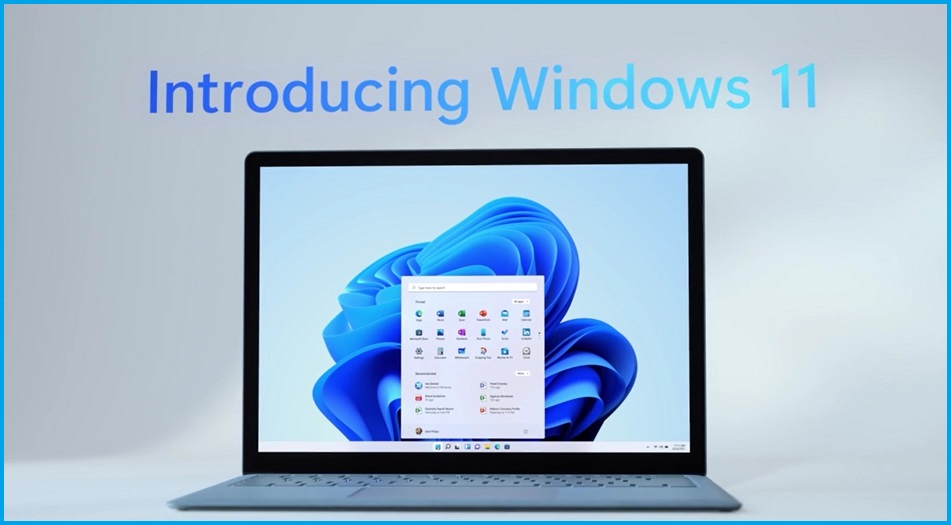Microsoft has officially announced Windows 11 after leaks surfaced online earlier this month, saying the Windows upgrade will be free – at least, initially – and include support for native Android apps.
Windows 11 will be more of the same you have come to expect from Microsoft’s flagship operating system (OS) over the past 35 years as the company continues to gradually iterate new features rather than radically overhaul the design.
Microsoft’s publicity for Windows 11 is built on the theme of ‘home’ – a message chief product officer Panos Panay was keen to get across in an announcement video.
Panay punctuated the metaphor with photos of his family home, saying “even though it’s changed, it’s been renovated still to this day the minute I step inside it feels right, it feels familiar, it feels like home”.
“It’s a space where we always know our way around. That’s inspiring to me and that’s what Windows should feel like.”
Panay’s attempt to compare a proprietary operating system with a loving home was a bit of a stretch and the underlying idea – that Windows hasn’t fundamentally changed much in 35 years and you only used it because it’s comfortable – might not exactly be the message Microsoft was looking for.
Throughout the 40-minute long presentation, the tech giant brought out its various product spokespeople to talk up the new and not-so-new features coming in Windows 11.
The first thing we see is the Start menu now rests in the centre of the taskbar. It’s got much of the same tiles you would expect from your Start menu but with rounder logos and that have a softer colour pallet, like Windows users already have with Microsoft Edge.
The start menu has a slight transparency which is part of Windows 11’s aesthetic as seen in the widget menu – yes, widgets are back – which is itself an extension of the weather and news pop-up widget that recently appeared next to the ‘hidden icons’ button in Windows 10.
Today marks the beginning of a new generation of Windows. With Windows 11, we’re reimagining everything from the operating system to the store, to unlock new opportunity for people and the world. https://t.co/IuMxrS262d
— Satya Nadella (@satyanadella) June 24, 2021
Under the hood, Panay said Microsoft has cleaned up those pesky Windows updates, making them “40 per cent smaller” and less intrusive. Browsing is “faster” on the new OS which “uses less energy” and is “the most secure windows yet”.
“To really understand its beauty, you have to see how it feels,” Panay said.
Based on the presentation and the responses of people who have installed leaked copies, it feels pretty much how it looks – like Windows.
There are a few new features like ‘snap groups’ which hold together a collection of applications you use for certain tasks to make it easier to switch between them.
One of the bigger introductions to Windows 11 is full integration with Teams.
It’s a move that mirrors the pre-installation of Internet Explorer in the late 1990s which led to a lengthy antitrust court battle against the tech giant for what was perceived as anti-competitive behaviour against rival browsers.
In Windows 11, Teams gets pride of place in the new centred start menu as Microsoft looks to combat the sudden surge of Zoom as the surprise pandemic video platform of choice. Microsoft owns Zoom rival, Skype.
Teams integration with the Microsoft Office suite has already been a source of contention for its workplace productivity rival Slack which last year filed an antitrust complaint against Microsoft saying the tech giant “created a weak, copycat product and tied it to their dominant Office product”.
Another big change to Windows 11 is the introduction of Android apps via the Microsoft Store. It’s a multi-layered integration of Android apps which uses Intel Bridge Technology, a “runtime post-compiler” from the chipmaker to enable native mobile apps on PCs.
The revamped Microsoft Store has a new e-commerce model that directly takes a shot at Apple – which is currently embroiled in a law suit with Epic Games over in-app purchases – by offering app developers an option to use a third-party commerce platform without paying a tax to Microsoft.
“This is the first version of a new era of Windows,” Microsoft CEO Satya Nadella said at the end of the announcement video.
“We’re building for the next decade and beyond.”
Windows 11 will be available later this year.










